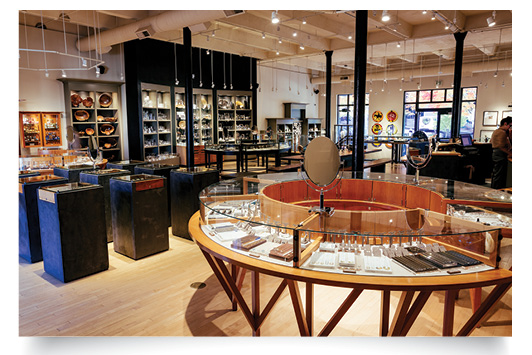
Paul Schneider didn’t need an “aha” moment to add a jolt of innovation to his business; for him and his wife Lauren Eulau, it has always been integral to who they are. “Being innovative is like breathing to us,” he says. It’s at the core of their jewelry store, Twist, which has locations in Portland, Oregon, and Seattle, Washington.
Their partnership began more than 40 years ago over a shared passion for beautiful things. As students at the University of Oregon, they were both pursuing creative endeavors; he studied pottery, and she specialized in weaving. Eventually they went from selling their own products to being part of an artists’ co-op to finally opening their first store in Portland almost 30 years ago. Along the way, they changed the store name — it was originally called Clay Trade — to reflect their evolution to “selling everyday objects with a twist.”
Looking for the next big thing has been easier from a position of financial stability. “Not freaking out about debt has given us the liberty to try things that we thought were amazing,” Schneider says.
He considers himself the “voice” of the business, and Eulau “the brains.” Although their tastes differ, they respect each other’s preferences, operating their business as “organic and intuitive” — and designer- focused. “We identify strongly with our designers and really promote the people behind the jewelry as well as the jewelry itself,” Schneider emphasizes. Given their respective creative backgrounds, he says, “it is part of our DNA.”
Giving the full story
Schneider views telling the designers’ stories as a “serious responsibility.” For him, the full story goes beyond a simple introduction; it includes how pieces are made and the meaning behind them, which ultimately connects them to the customers. “Jewelry can express important elements in your life and in the life of your family and relationships,” he explains. “It is really fulfilling for me to shed a light on the people who create this beautiful jewelry.”
One way he helps designers share their stories is through videos that feature prominently on his website, Twistonline. “This is a huge boost for their confidence, and they know other designers see them, editors see them, people in the galleries see them — as well as their families, who may be scattered across the globe. It is worth the cost of doing them.”
Schneider seeks out new designers in “every possible way,” through shows and recommendations. When he asks for exclusive rights to sell their jewelry, he also makes an effort to see things from their perspective. “It is better to have that [exclusivity] conversation in advance rather than later. We try to get the great young designers early in their career. But we also don’t want to take advantage of our power and hold them back.”
That caring attitude comes through in other ways, too. Designers often become like family; Schneider will even invite them to his home and cook for them.
The shopping experience
While the selection of designers appeals primarily to the tastes of people in the Pacific northwest — who tend toward more conservative styles — most of the online purchases are from people outside that area.
Much to his initial surprise, Schneider found that locals were spending “a ton” of time on the website. “We didn’t realize it would be a tool for local people to pre-shop or educate themselves about a product they’ve purchased or [are] planning to buy, and even to create wish lists.” This channel has been “better than putting an ad in a magazine,” he says.
As for the in-store experience, he credits architect Richard Altuna with the design and says he’s had a significant impact on Twist’s success. Altuna, who is based in Los Angeles, California, is a “retail architectural savant” who uses décor to tell a story that gets you hooked from the first page, according to Schneider. “It’s as if something registers in your brain that you are welcome before you’re even through the door.” That gets reinforced through the sightlines, the lighting, the temperature, the music — even the volume — before a client sees the product or interacts with a salesperson. “Altuna understands how people seek intimacy as well as a large sense of space.”
Twist received the Jewelers of America (JA) GEM award for retail innovation in 2020 for both brick-and-mortar and e-commerce. Schneider is enormously proud of that industry recognition. “We embrace new ideas and new technologies. That hasn’t changed since day one.”
In addition, Schneider himself won the Cindy Edelstein Award at the Couture fair in 2018 for showing a long-standing dedication to the success of artist and designer jewelry.
Before and after COVID-19
Last year was the best in Twist’s history, according to Schneider, and the first quarter of 2020 was on track to be the company’s best quarter ever — until the coronavirus hit and the stores closed.
“We are dealing with a before-and-after reality,” he says. Although not one order was canceled — and in fact, during this interview, he received an online order for a pair of earrings at full retail price from a customer in California — Schneider is concerned for the people he cares about. “We employ a lot of people. We are vital in the lives of our designers and our customers and our community.”
He has no idea how this crisis will impact the future of fine jewelry, and he doesn’t trust anyone who says they know. “But I do believe in the resilience of people. The worst passes, and people survive.... For now, it is important for people to remember that they should be true to who they are. I’m lucky we’ve found that.”
twistonline.com
Image: TwistArticle from the Rapaport Magazine - May 2020. To subscribe click here.